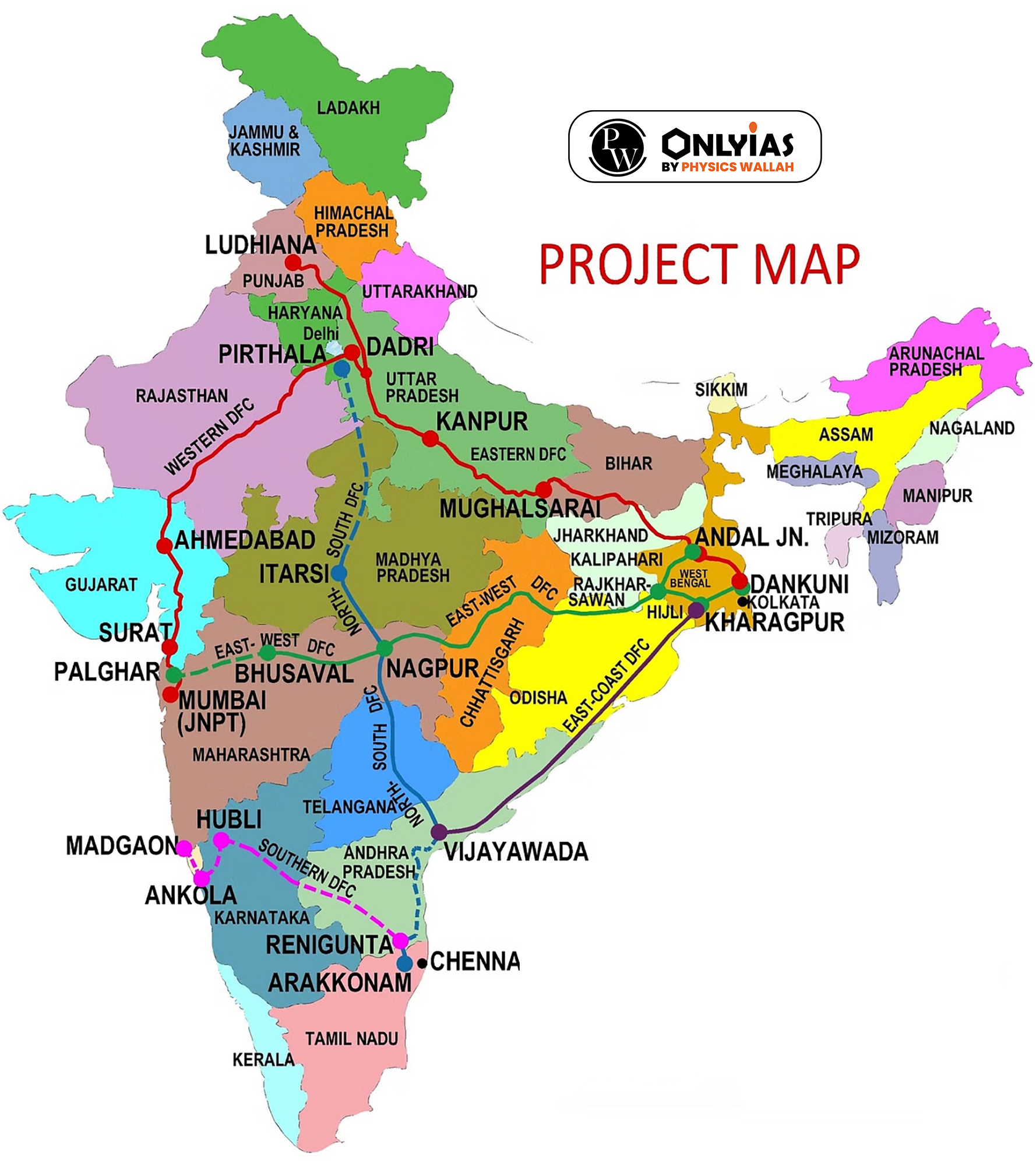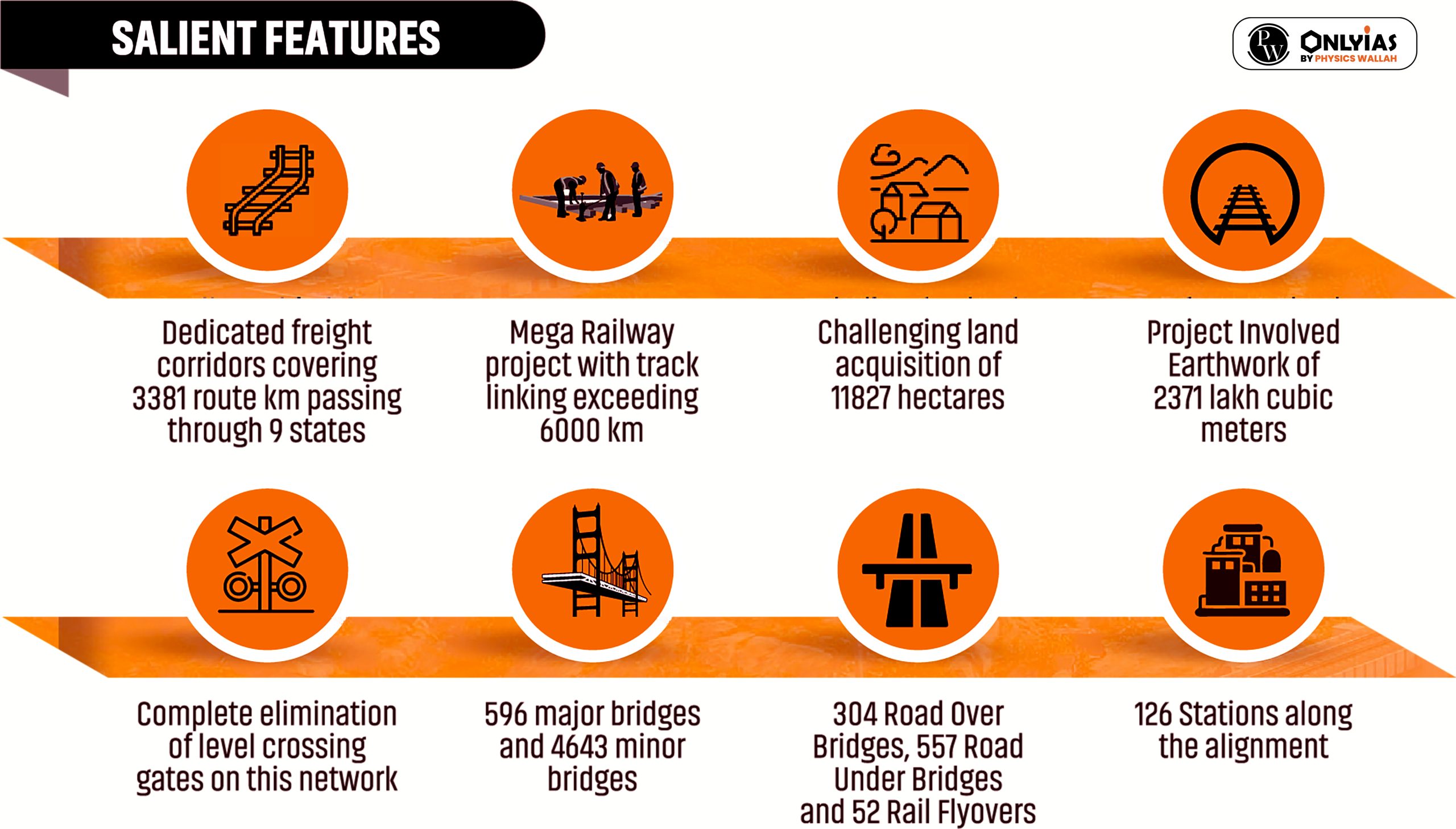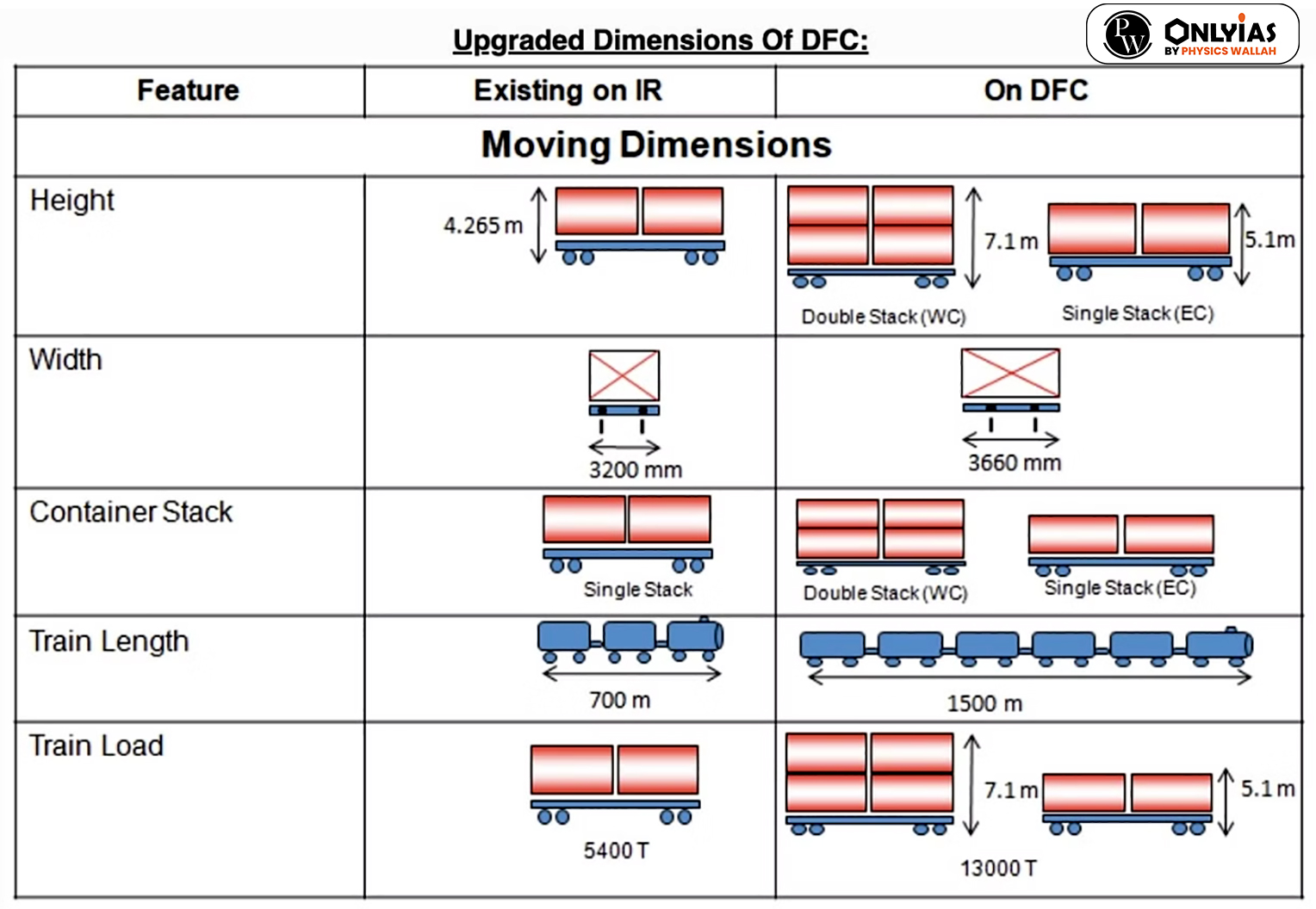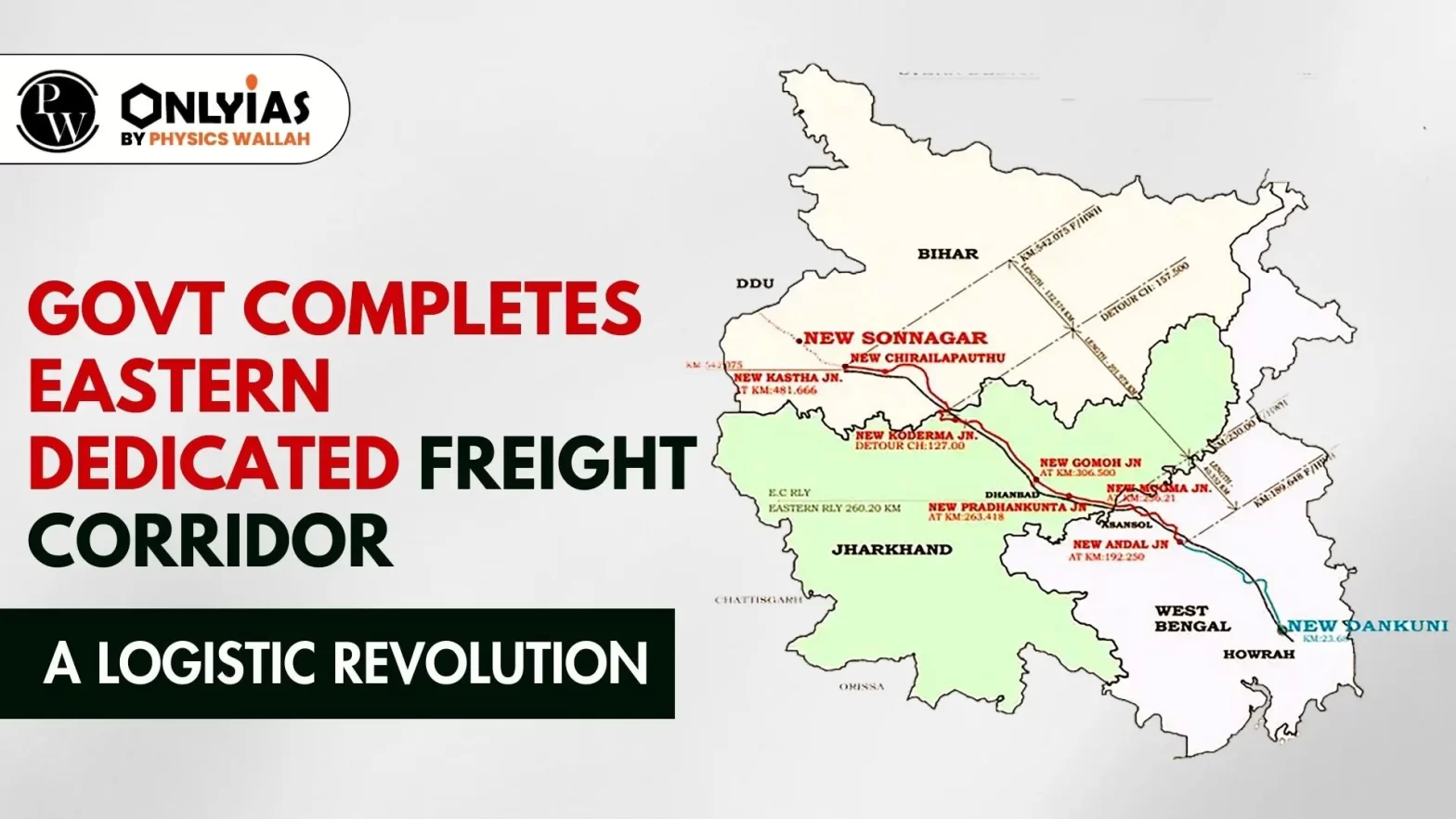Context:
- This article is based on the news “A new beginning” which was published in the Business Standard. The entire Eastern Dedicated Freight Corridor spanning the 1,337 km Ludhiana in Punjab and Sonnagar in Bihar is complete. Commercial operations on the full corridor are likely to start in November 2023.
| Relevancy for Prelims: Dedicated Freight Corridors in India, National Rail Plan, and Western and Eastern Freight Corridors.
Relevancy for Mains: Dedicated Freight Corridors; Transforming Rail Freight in India, and what are significance and challenges of dedicated freight corridors. |
Dedicated Freight Corridors; Transforming Rail Freight in India
- The operational corridor will benefit the thermal power plants in UP, Punjab, Haryana, and parts of Rajasthan as it will cater largely to coal traffic.
- The surging domestic economy, booming infrastructure construction and growing international trade led to the conception of the Dedicated Freight Corridors (DFC) along the Eastern and Western arms of the Golden Quadrilateral.
- Over the year, Railways lost the share in freight traffic from 88% in 1950-51 to 26% in 2021-22. Also, the National highways along these corridors comprising 0.5% of the road network carried almost 40% of the road freight.
- The National Rail Plan (NRP) strives to enhance the rail share in the country’s freight transport from 27 percent to 45 percent in which Dedicated Freight Corridors will play a very important role owing to the reduced transit time and lower logistics cost.

What is a dedicated freight corridor?
- The Ministry of Railways (MoR) has taken up construction of two Dedicated Freight Corridors (DFC) viz. Eastern Dedicated Freight Corridor (EDFC) from Ludhiana Punjab to Dankuni West Bengal (1,760 km) and the Western Dedicated Freight Corridor (WDFC) from Jawaharlal Nehru Port Terminal (JNPT) to Dadri (1506 Kms.).
- The Connecting Link for Eastern & Western Arm is under construction between Dadri & Khurja.

| Western Dedicated Freight Corridor |
Eastern Dedicated Freight Corridor |
| 1,468 km |
1,760 km |
| Dadri, U.P to Jawaharlal Nehru Port, Mumbai. |
Ludhiana Punjab to Dankuni West Bengal |
| The WDFC covers Haryana, Rajasthan, Gujarat, Maharashtra & Uttar Pradesh. |
The EDFC route covers Punjab, Haryana, Uttar Pradesh, Bihar, Jharkhand & West Bengal |
| The Japan International Cooperation Agency. |
The World Bank is funding EDFC |
Also read: Decarbonising Transport Sector
What is the significance of a dedicated freight corridor?
Saturation of the Existing Infrastructure
- The Indian Railways’ Golden quadrilateral linking the four metropolitan cities of Delhi, Mumbai, Chennai and Howrah, and its two diagonals (Delhi-Chennai and Mumbai-Howrah) comprises 16% of the route but carry more than 52% of the passenger traffic and 58% of revenue earning freight traffic of IR.
- This trunk route is highly saturated with line capacity utilization varying between 115% to 150%.
Efficiencies
- Railways are about 12 times more efficient in freight traffic than road transport and three times more efficient in passenger traffic.
- The average speed of freight trains on the DFCs will be 50-60 kmph from the existing 25 kmph on Indian railway tracks.
- The Western DFC has cut freight travel times between 24 to 48 hours for cargo moving between North India and port infrastructure on the western coast of India.

- Reduce logistic cost: Railway transportation is generally more cost-effective than road transportation for bulk goods like salt, Coal, cement, etc.
- Each kilometer-long freight train on the Eastern dedicated freight corridor will replace some 72 trucks on average. This will ease congestion on India’s often vercrowded roads and highways, which carry an overwhelming 60 percent of the country’s freight, and make the roads safer, as per a World Bank report.
- The logistics cost in India is 13 percent of the GDP compared to 8 percent of the global average, making it difficult for Indian exports to compete globally.
- India improves in the logistics ranking of the World Bank by jumping 6 places to Rank 38 out of 139 countries in the Logistics Performance Index (LPI 2023)
Green Impact: The corridor will rely entirely on electric locomotives, which in turn will result in a substantial reduction in carbon emissions.
- It is expected that dedicated freight corridor will save more than 450 million tons of CO2 in the first 30 years of operation (Assessment based on Ernst & Young study).
- For instance, the Khurja-Bhaupur section alone will decrease the country’s CO2 emissions by some 4.2 million tonnes between 2022 and 2052 and significantly reduce air pollution.
Industrial Development And Regional Revitalisation
- Establishing industrial zones at strategic junctions along its route is poised to breathe new life into some of India’s poorest and most densely populated regions.
- The Nangal Chaudhary Integrated Multi-Modal Logistics Hub (IMLH) Project facilitates economic activities between the National Capital Region (NCR)/Northern States and the Mumbai Port (JN Port) by utilizing the cost-efficient and high-speed Western Dedicated Freight Corridor (WDFC).
What are the challenges with dedicated freight corridors?
- Project Target and Cost
- The Project is facing a delay over the original deadline of 2017-18. This delay has increased costs for both legs of the project by 54 percent to Rs 1.24 trillion.
- In 2022, for instance, the Comptroller & Auditor General pulled up the DFCCIL for cost overruns because of the slow pace of handing over land to contractors, utility shifting, delays in design, and overhead equipment work, pointing to sheer organizational inefficiency.
- Planning and execution
- Planning has been an issue since the project’s conception. MoR approached the Cabinet Committee on Economic Affairs with cost estimates based on the Japan International Cooperation Agency (JICA) Feasibility Report without forming a financing plan for EDFC or a CA between MoR and SPV. [CAG, 2015].
- The original Easter dedicated freight corridor was to extend as far as Dankuni, West Bengal. The current one terminates at Son Nagar, Bihar.
- Double stack vs Single stack
- The project has adopted different technical standards for WDFC and EDFC. This makes a seamless movement of double-stack trains from WDFC to EDFC impossible.
- Moving dimensions made for double-stacked containers is 7.1 meters for WDFC and EDFC single-stack container operations is 5.1 meters.
- Renewable resources vs coal
- With an inclination towards using renewable resources in the future, the viability of the EDFC could be a concern since most of the traffic was expected to be coal for power plants in northern India from the coal fields in the east.
- Industrial Corridors: The progress for Logistics Parks and the Delhi-Mumbai Industrial Corridor(DMIC) has been very slow. DMIC was approved in 2007 by the Union Cabinet. Eleven years after the approval, the DMIC is progressing slowly.
- Amritsar Kolkata Industrial Corridor, approved by GoI in 2014, was to be developed along the alignment of EDFC, however, even after 10 years, the progress has been only up to preparing the ‘Perspective Plan’.
- Land acquisition: As of December 2018, DFCCIL has acquired 98.5% of the required land. Though only 1.5% remains (presumably due to difficulties in land acquisition), these have a higher number of affected patches per kilometer. It can pose a problem in constructing the DFC and further delay the project’s completion timeline.
Dedicated Freight Corridor Corporation of India Ltd (DFCCIL)
- It is a special-purpose vehicle set up under the administrative control of the Ministry of Railways.
- It mandates the planning & development, mobilization of financial resources and construction, maintenance and operation of the DFC.
- DFCCIL was incorporated in October 2006 under the Indian Companies Act 1956.
|
Way Forward
- Land acquisition: Given the land acquisition difficulties in India, the fact that 1077 km out of 1504 km of WDFC and 1111 km out of 1318 km of the non-PPP EDFC are adjacent to the existing IR network has been a positive for DFCCIL.
- Ownership of SPV: The Committee on Infrastructure had constituted a Task Force in May 2005. It recommends that the SPV should have a joint ownership between MoR and the “users of bulk freight services largely in the public sector. It would have ensured an adequate equity base, which could be used to leverage market borrowings to raise capital for investment in the dedicated Freight corridor
- Industrial Corridor: Establishing industrial zones at strategic junctions along its route is poised to breathe new life into some of India’s poorest and most densely populated regions. This development will create jobs and stimulate economic growth in areas that have traditionally lagged behind in industrialization.
- Future DFC Corridors: The Union Budget 2021-22, announced that the government would in the future undertake dedicated freight corridor projects — East Coast, East-West Corridor and North-South Corridor from Itarsi to Vijayawada. The Processes are still in the nascent stage and need to be fast-tracked for timely completion of projects.
- Expansion to Neighbouring Countries: Enhancing intra-regional trade is necessary to increase connectivity in south asian regions. The ensuing economic growth would also play a key role in bridging the trust deficit in the region and raising the opportunity cost of conflict.
- It also helps to counter increasing China’s presence through its Belt and road initiative.
Conclusion:
The completion of the Eastern Dedicated Freight Corridor in India marks a significant step in transforming rail freight, reducing logistics costs, and promoting economic growth. Despite challenges, further expansion and strategic planning hold the key to maximizing the benefits of dedicated freight corridors for the country’s development.
| Prelims Question (2015)
With reference to bio-toilets used by the Indian Railways, consider the following statements:
1. The decomposition of human waste in the bio-toilets in initiated by a fungal inoculum.
2. Ammonia and water vapour are the only end products in this decomposition which are released into the atmosphere.
Which of the statements given above is/are correct?
(a) 1 only
(b) 2 only
(c) Both 1 and 2
(d) Neither 1 nor 2
Ans: (d) |
![]() 17 Oct 2023
17 Oct 2023



